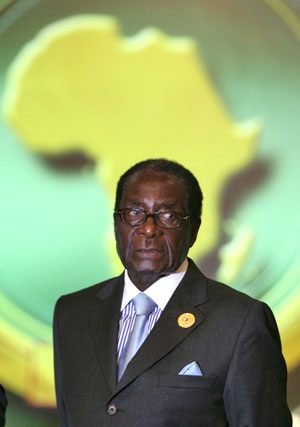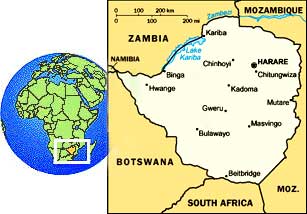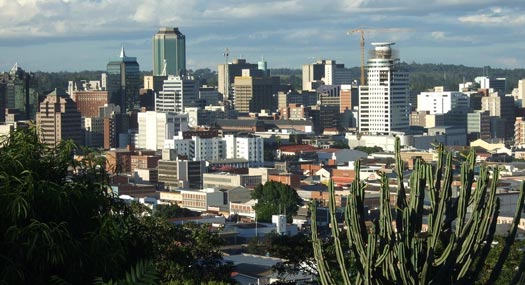Zimbabwe faces political turmoil
By Brian E. Muhammad -Staff Writer- | Last updated: Nov 21, 2017 - 2:46:42 PMWhat's your opinion on this article?

President Robert Mugabe
|
There were mass demonstrations throughout Zimbabwe calling for leadership change primarily led by opposition groups and leaders. The ruling Zimbabwe African National Union Patriotic Front (ZANU-PF) party convened an emergency November 19 meeting to address the political crisis in the country. ZANU-PF removed Pres. Mugabe as party head and at Final Call presstime, gave him an ultimatum to resign office by noon Nov. 20 or face impeachment proceedings.
The same day, Pres. Mugabe—who has been a political foe of Western powers— addressed the nation on national television in a talk Western media anticipated would be his resignation speech. He did not quit and pledged to preside over a national ZANU- PF congress scheduled for early December.

|
“They were quite upset that he didn’t resign; I mean it was none of their business,” said Abayomi Azikiwe, a political commentator.
Mr. Azikiwe told The Final Call that it’s a “complicated situation” and a “factional dispute” within the ZANU-PF that’s being resolved internally—which is good, he said.
“Otherwise the imperialists are looking at all kind of ways at intervening in this, to reverse all the gains of the independence struggle for the last 37 years,” Mr. Azikiwe explained.
South Africa sent mediators to Zimbabwe to monitor negotiations between Pres. Mugabe and General Constantino Chiwenga, who led the military action that intervened in the government. The military move triggered fear and anxiety on whether the action was the latest coup on the African continent or not. Now with impeachment proceedings underway at Final Call presstime, analysts and observers are saying it’s still largely a wait and see situation.
“I think now it’s clear that it’s a coup,” said Emira Woods, member of the International Working Group for Africans Striving for Justice, Peace and Dignity.
“I think the key thing is what happens next. To what extent there will be a commitment to elections that were scheduled for 2018 (and) what happens between now and then,” Ms. Woods said.

Republic of Zimbabwe Capital City, Harare
Zimbabwe has an estimated population of 16.2 Million people. |
She also raised the point that both the African Union and the regional Southern African Development Community (SADC) have a mandate not to recognize any government that comes to power in a coup.
Akbar Muhammad, International Representative of the Nation of Islam agrees, “however, there are some exceptions,” he says. “The United States, England, France and Italy backed insurgent forces in Libya against Muammar Gadhafi resulting in his assassination. The government installed wasn’t banned or ostracized by the African Union nor other international bodies,” said Mr. Muhammad.
“The move also appeases foreign powers like the United States and Britain, which has long called for his removal and American sanctions against Zimbabwe contributed to the suffering of its people,” he said. “It’s a contradiction and convoluted.”
The military has maintained it was not an overthrow. On state television, a member of the Zimbabwe Defense Forces read a statement saying it was not a “take-over” and that Pres. Mugabe and his family were safe, and their security was guaranteed.
“We are only targeting criminals around him who are committing crimes that are causing social and economic suffering in the country in order to bring them to justice,” he read.
“As soon as we have accomplished our mission we expect that the situation will return to normalcy.”
Albeit, without Pres. Mugabe. The 93-year-old leader has led the country since the end of White minority rule in 1980.
Zimbabwe watchers are also saying that the politics around succession of Pres. Mugabe is also a factor. Recently he fired Zimbabwe’s vice-president Emmerson Mnangagwa—a decision that “did not sit well” within the military.
According to the Zimbabwean government, Mr. Mnangagwa, 75, a former intelligence chief with strong ties to the military, had exhibited disloyalty, disrespect and deceitfulness. The removal is believed by some to open the door for the country’s First Lady, Grace Mugabe to fill the position which has been a political powder keg between the president and opponents.
“She simply did not have the support of the military and on top of that, this was taken place at the same time that former military were being purged,” said Bill Fletcher, former president of TransAfrica Forum and senior scholar with the Institute for Policy Studies.
These events could have ignited the actions of the military leaders. The former vice-president Mnangagwa who was exiled out of the country after his ousting, fought alongside Mugabe in Zimbabwe’s liberation struggle.
Days before seizing power, in a Nov. 13 public statement, General Chiwenga delivered a highly critical assessment of the ruling ZANU-PF party in what many took as a threat on the government. His grievances in part were over its treatment of liberation era figures and the dire economic conditions of the country.
“It is with humility and a heavy heart that we come before you to pronounce the indisputable reality, there is instability in ZANU-PF today and as a result anxiety in the country at large,” said General Chiwenga reading from a prepared statement. The top military leader blamed confusion within the ruling party and dissatisfaction among Zimbabweans on the “machinations of counter-revolutionaries” who infiltrated the party and whose agenda is to destroy it from within.
The statement called them “agents” of outside enemies who didn’t participate in the struggle that achieved independence and brought Pres. Mugabe to power.
“The other thing that’s concerning is that it’s not clear when the military will leave,” remarked Mr. Fletcher, who added that he is “holding my breath” on the situation.
He also said there is concern about the plight of working people and a potential “uptick in repression against unions and other working people’s organizations.”
During the ZANU-PF emergency meeting, its Central Committee voted to reinstate Mr. Mnangagwa and placed him as the head of the party, replacing Pres. Mugabe. This opens the way for the former vice president to ascend to the presidency.
Mr. Mnangagwa being positioned as president of a transitional government is also accepted as the preferred candidate of the international community, where he is seen as most likely to guarantee a stable transition and implement economic reforms.
Mr. Mnangagwa’s viewpoint is to try and accommodate the World Bank and International Monetary Fund in addressing the economic crises, said Mr. Fletcher.
“Zimbabwe is in deep economic trouble, but an accommodation could very well mean accepting the terms and conditions that the IMF and the World Bank would want to impose on Zimbabwe … means repression of working people,” explained Mr. Fletcher.
Meanwhile, pressure is mounting for Pres. Mugabe’s removal. Right now, the future of Zimbabwe hangs in the balance with more questions than answers.
“Without a thorough understanding of the background and the political dynamics and traditions in Africa, misunderstanding can exist concerning the situation,” said Mr. Muhammad.
INSIDE STORIES AND REVIEWS
-
-
About Harriett ... and the Negro Hollywood Road Show
By Rabiah Muhammad, Guest Columnist » Full Story -
Skepticism greets Jay-Z, NFL talk of inspiring change
By Bryan 18X Crawford and Richard B. Muhammad The Final Call Newspaper @TheFinalCall » Full Story -
The painful problem of Black girls and suicide
By Charlene Muhammad -National Correspondent- » Full Story -
Exploitation of Innocence - Report: Perceptions, policies hurting Black girls
By Charlene Muhammad -National Correspondent- » Full Story -
Big Ballin: Big ideas fuel a father’s Big Baller Brand and brash business sense
By Bryan Crawford -Contributing Writer- » Full Story






 Click Here Stay Connected!
Click Here Stay Connected!








